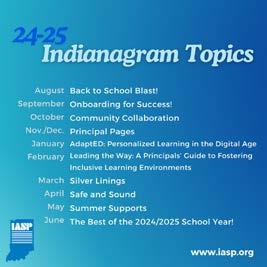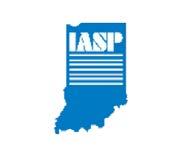






Kicking Off the School Year: Embracing the Back-to-School Blast
As the school year begins, a familiar mix of excitement and anxiety fills the air. It’s a season filled with fresh possibilities and the promise of new beginnings. Students, parents, and educators alike are gearing up for what lies ahead, and as school leaders, you hold the power to shape this year’s journey. Your outlook and approach can set the tone for an enriching, productive, and supportive school year.
There’s no denying that the start of a new school year is an emotional rollercoaster. For students, it’s a transition filled with anticipation and, often, a touch of nervousness. Teachers and administrators feel it too, juggling the excitement of fresh opportunities with the anxiety of navigating unknowns. It’s crucial to acknowledge both these feelings and approach them with a balanced mindset.
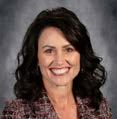
Your perspective as a leader will influence how everyone else feels about the school year. If you can channel your enthusiasm and manage your anxieties constructively, you’ll help create an environment where students and staff alike can thrive. It’s okay to feel a bit nervous— what matters is how you address and manage those feelings.
As educational leaders, you have a profound impact on the school environment. Your attitude and approach set the stage for the year ahead. A positive, open-minded perspective can foster a supportive and collaborative atmosphere. When you lead with a mindset that embraces flexibility and growth, it encourages others to do the same.
Be mindful that while the ideal is to have everything running smoothly from day one, reality often includes bumps along the way. It’s essential to be prepared for setbacks and to approach them with a solution-oriented mindset. Your ability to adapt and pivot when necessary will serve as a model for your staff and students, demonstrating resilience and the value of continuous improvement.
No one is perfect, and that’s perfectly okay. The journey through a school year will inevitably include challenges and mishaps. The key is to not be too hard on yourself when things don’t go as planned. Instead, view these moments as opportunities for growth and learning.
Be open to feedback from your staff and willing to make adjustments based on their insights. Listening to and incorporating their ideas fosters a culture of collaboration and innovation. When staff sees that their leaders are humble and receptive to feedback, it creates an environment where everyone feels empowered to contribute and take risks without fear of reprimand.
One of the most effective ways to build a positive and productive school environment is to demonstrate humility and accountability. When things don’t go as planned, don’t shy away from taking responsibility. Acknowledge mistakes and use them as teaching moments, not just for students but for your staff as well. This approach encourages a culture of transparency and mutual respect. Your willingness to accept mistakes and make necessary adjustments helps create a safe space. When staff and students see that mistakes are a natural part of the learning process and not something to be feared, they are more likely to embrace new ideas and innovative practices.
As you kick off the school year, remember that it’s a time of both excitement and challenge. Your perspective, openness, and approach will significantly influence the atmosphere within your school. Embrace the journey with enthusiasm, acknowledge and address challenges with a problem-solving mindset, and foster a culture where mistakes are seen as learning opportunities rather than setbacks. By leading with humility and openness, you’ll set a positive tone that supports everyone’s growth and success throughout the year.
Here’s to a successful and fulfilling school year! I look forward to navigating the year’s challenges and celebrating its successes together through IASP.
Dr. Holly Arnold IASP President
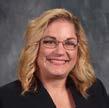
As the leaves begin to change and the air fills with the excitement of a new school year, it’s my pleasure to welcome you all to the first issue of the IASP Indianagram for the 2024-2025 school year. Each month, the Indianagram is designed around a focal point or theme relevant to busy school leaders. This allows us to highlight accomplishments around the state of Indiana. I’m Dr. Tiffany D. Barrett, IASP Assistant Executive Director and Editor in Chief of the IASP Indianagram, and I couldn't be more thrilled to kick off this year with our theme, "Back to School Blast!"
This theme encapsulates the energy and enthusiasm we all feel as we start a new year, ready to embrace new challenges and opportunities. The beginning of a school year is a time of renewal—a chance to set goals, establish new routines, and make connections that will shape our students' futures. It’s a season of hope and possibility, where the groundwork for a successful year is laid. The School Leader Paradigm outlines ways to maintain a strong and successful school, focusing on areas such as leadership development, creating a positive culture, fostering collaboration, and emphasizing continuous improvement. The beginning of a new year is a great time to reflect on past practices and set goals for future successes. For more detailed insights, you can refer to the full school leader paradigm document here
This year, I encourage you to share your stories with us. The Indianagram is not just a newsletter; it’s a platform for our community of educators to come together and celebrate the incredible things happening in our schools. Whether it’s a groundbreaking project, an inspiring student, or a creative teaching strategy, we want to hear from you. Let’s make this year’s Indianagram a vibrant tapestry of the diverse voices and experiences within our IASP family. Here's to a fantastic school year filled with growth, joy, and shared successes. Together, we can make this "Back to School Blast" truly unforgettable. Warm regards,
Dr. Tiffany Barrett
IASP Assitant Executive Director
2024-2025 Themes
August: Back to School Blast!
September: Onboarding for Success!
October: Community Collaboration and Initiatives
November/December: Principal Pages
January: AdaptED: Personalized Learning in the Digital Age
February: Leading the Way: A Principals’ Guide to Fostering Inclusive Learning Environments
March: Silver Linings
April: Safe and Sound
May: Summer Supports
June: The Best of the 2024/2025 School Year!
Share your thoughts on the Indianagram: https://forms.gle/sCmLHwnh4aYcTJdr8
IASP Executive Committee
Dr. Holly Arnold President
Andy Allen President-Elect
Bret Bailey Vice President
Dr. Crystal Murff Thorpe Past President
Raimeka Graham
NAESP State Representative
Dave Strouse
NASSP State Coordinator
Steve Baker Liaison to the DOE
Kristen Peterson
Assistant Principal Liaison

IASP hosts events throughout the year to support the growth and development of Indiana school administrators and students. Each event is intentionally designed to encourage and engage all participants in the pursuit of learning!
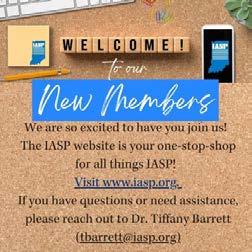
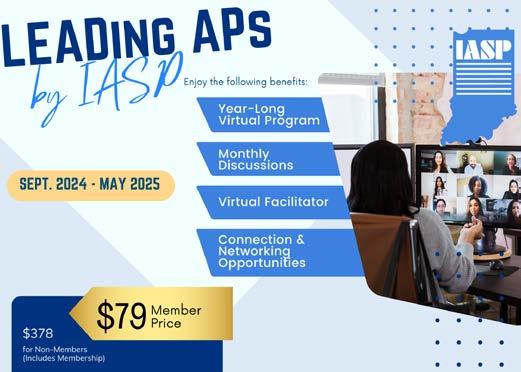

Dr. Katie Jenner Indiana Secretary of Education
I’m drafting this Indianagram message on the eve of my twin daughters’ first day of high school. Like many of you, I’m both an educator and a parent. While one of the twins has described her nervousness, the other says she’s ready and not worried at all.
Between late-July and mid-August, we welcome about 1.13 million children back to school across Indiana. By the time you read this, some of you may be approaching your first day too, while others may already have a week or two under your belt. My hope and prayer for you is that this is an excellent school year ahead.
As school leaders, it is inevitable that fires will hit our desk. Sometimes there are multiple fires per day and sometimes there are multiple fires per hour. Remember, you are in this leadership chair for a reason! You have proven that you care about student learning, that you are committed to driving continuous, positive improvement, and that you are a solution-finder (you can put out the fires!). And you have also prepared for success. In fact, many of you have been hard at work over the past couple of months –from providing student supports and educator preparation to growing your own learning. You are ready to take on a new year!
Speaking of that preparation, today I’d like to highlight just a few examples of the summer learning that took place across Indiana:
This summer, we partnered with the Mind Trust to expand the successful Indy Summer Learning Labs to multiple communities across the state. In 2023, students participating in the Indy Summer Learning Labs had a 23 percentage point increase in reading scores and a 22 percentage point increase in math scores, as measured by pre- and post-assessment data.
Together, we were able to expand this impactful opportunity for nearly 9,000 Hoosier students this summer, providing five weeks of reading and math tutoring, as well as other enrichment activities.
The 2024 Expanding What Works grant recipients included:
■ Boys and Girls Clubs of St. Joseph County in South Bend ($3,750,000)
■ Urban League of Northwest Indiana in Gary ($1,125,000)
■ Creating Avenues for Student Transformation (CAST) in Salem ($115,073)
■ Wabash County YMCA in Wabash ($396,000)
We must continue to work together to ensure the financial investments we make are moving the needle for students, and we are thrilled to extend the Expanding What Works grants to more communities and students across Indiana.
One of my favorite days this summer was traveling to Rose-Hulman Institute of Technology in Terre Haute to experience Operation Catapult While there, we talked to students participating in this two-week summer camp, which provides an opportunity for high school students from Indiana (and around the world!) to participate in cutting-edge STEM projects while also getting to experience life on a college campus.
The students were immersed in a variety of hands-on learning projects, from coding, to engineering design, to food chemistry, and much more, and were driving their own learning. It was inspiring to see their passion for learning come alive.
Thank you to the Mind Trust, RoseHulman, and the many, many others who offered summer learning opportunities for Hoosier students!
Alongside our students, educators also spent significant time this summer engaging in work that will positively impact teaching and learning throughout the 2024-2025 school year.
Our state once again partnered with Get Your Teach On to offer four free conferences across the state for teachers and administrators. These sell-out crowds hosted more than 1,400 educators who signed up for these events, providing every Hoosier educator the opportunity to learn, recharge, and reflect on their purpose as difference-makers for our students. Many educators have shared that these conferences are the best professional development they have ever attended, and this partnership has certainly been one of the most impactful things we have done as a state to elevate the educator profession.
Additionally, more than 3,000 educators participated in this year’s Summer of Learning Conferences held across Indiana. Educators were able to connect with innovative, technology-enhanced pedagogy related to Universal Design for Learning (UDL) and accessibility, science of reading, integrated STEM standards, academic recovery, and designing virtual and blended learning experiences.
There are so many more examples I could share, but all this to say, while it may be the beginning of a new school year, for many Indiana students and educators, the hard work and learning continued throughout the summer. Thank you for your constant commitment to being the best you can be for our students, and for helping them to achieve their unique dreams. And, as one of the principals I worked with in the past always ended their daily announcements, “Let’s make it a great day (year), the choice is yours.” Let’s continue working together and make this year a great one!

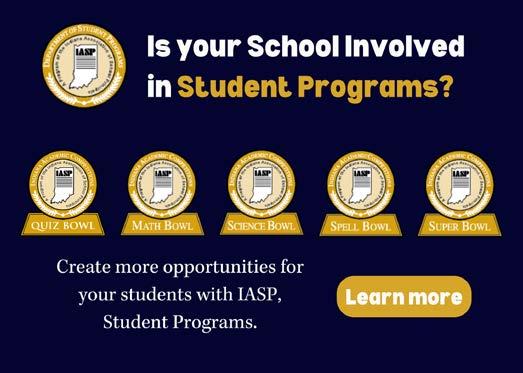

Mrs. Kristen Peterson Associate Principal Chesterson High School
IASP Assistant Principal Liaison
Hello, Fellow Assistant Principals, Deans, and Aspiring Administrators! I hope that everyone had a chance to relax and recharge this summer before you began to gear-up for an exciting new school year. My name is Kristen Peterson, and I am the Associate Principal at Chesterton High School, as well as the new Assistant Principal Liaison to the IASP Executive Committee of the Board of Directors. While Dan Peo, the new Principal at Avon Middle School South (congratulations, Dan!) has left me with big shoes to fill, I am looking forward to serving and supporting all of you in this capacity. The liaison role is designed to amplify the voices of APs, Deans, and Aspiring Administrators as the Board of Directors provides governance for the business of IASP. Through the Indianagram and the AP Lense Podcast, I look forward to working together to showcase the remarkable work being done across the state.
As we prepare for the upcoming school year, there is an underlying current that we all anticipate surfacing. When the newly enacted K-12 legislation fully emerges, it is my hope that we can join forces to help navigate our new direction. While we are all at different starting points, I strongly believe that we can all benefit from the great things that many of us around the state already have in place. I sent out a short survey in July to identify your areas of interest as well as expertise; for those who have already responded, I appreciate your feedback. If you didn’t get a chance to complete the survey, please consider doing so at your earliest convenience. Just knowing which school we can reach out to for guidance on varying components of these new requirements such as: the Early Literacy Endorsement, redesigned 3-8 ILEARN Assessments, Attendance, ICC, Internships/WBL, Career Discovery Meetings, Graduation Pathways, etc., will hopefully help ease the transition for everyone. At Chesterton, we have spoken to quite a few schools about implementing an internship/work study program at scale. If you would be interested in learning more, please don’t hesitate to reach out. In the end, all of our students can benefit from our collaborative efforts, and we will all feel less isolated and more supported throughout the year.
As leaders, we will be the lighthouse that will determine how the people in our buildings and communities in which we serve will view our new expectations as we welcome back staff and students. Lighthouses provide a sense of direction, safety and hope, and symbolize staying on course, making informed decisions and finding our way through uncertainty. I frequently recall a YouTube video from entrepreneur, author and motivational speaker, Jesse Itzle, about the importance of paying attention to the words that we speak and think. In his video, The Words You Speak Matter, Itzle reinforces how much of what we say impacts those around us. Similarly, how
we communicate our new requirements will influence how those we lead will interpret and feel about those changes. While Itzle was training for the grueling endurance race called The Last Man Standing, he was taught to respond to questions about how he was feeling with a positive reply. Itzle would then declare, “Outstanding!” as his response, despite the anguish he was actually experiencing. This consistent positive reinforcement is what enabled him to mentally (and physically) finish the race. I would like to encourage you to consider how you might respond to others when they ask you how you are doing, and what message as a leader you might be conveying in that response. For example, instead of, “Oh, I’m livin’ the dream.” try replacing that with, “Outstanding!” or something positively similar. At the very least, you will feel better having given a more encouraging response! Be the lighthouse that our communities are looking towards to guide and direct them safely through the anticipated changes.
Finally, steering the ship this school year is going to require a lot of teamwork. Just as shipmates communicate, collaborate and coordinate actions during complex operations on a ship, school counselors will be critical players to include in conversations around the newly enacted legislation. We are going to get creative with how we structure our course offerings, schedules, and methods of documentation, and counselors are who we need to be tapping into and supporting. We have found it extremely helpful to hold monthly administrator/counselor meetings to touch base and problem solve together. This open line of communication has enabled us to be proactive in the past, and will ensure that we are all rowing in the same direction in the future.
Through IASP and our state-wide collaborative efforts, we don’t want anyone to feel as though they will be stranded on an island this year. We can collectively navigate any and all challenges and changes that we may contend with this year. I look forward to meeting you, and supporting you through your leadership journey. If I can be of any help along the way, please don’t hesitate to reach out! In addition, if you would be interested in co-authoring with me for an Indianagram article, please contact me at: kpeterson@duneland.k12.in.us
I hope you have a great school year!
Indianagram Topics of Interest Survey
Thank you,
Kristen Peterson kpeterson@duneland.k12.in.us


Dr. Tiffany Barrett Assistant Executive Director
As we embark on a new school year, the opportunity to inspire and lead our educational communities is both a privilege and a responsibility. The Indiana Association of School Principals (IASP) offers a framework in the School Leader Paradigm that can guide us in creating an environment conducive to learning and growth. This article explores how principals, assistant principals, and deans can integrate elements of this paradigm to kick off the school year effectively.
The foundation of impactful leadership is selfawareness. As school leaders, taking the time to reflect on our strengths and areas for growth is crucial. The School Leader Paradigm emphasizes the importance of personal leadership as the starting point for all other leadership dimensions. Begin the year by setting personal development goals, perhaps through professional learning communities (PLCs) or peer mentoring. Encourage staff to do the same, fostering a culture of continuous improvement and self-reflection.
Trust is the bedrock of any thriving school community. The relational aspect of the School Leader Paradigm underscores the need for leaders to build authentic relationships with staff, students, and parents. Start the year with initiatives that promote open communication and collaboration. Consider hosting a "Welcome Back" event where staff and families can interact in a relaxed setting. Additionally, establishing regular channels for feedback, such as surveys or open forums, can help leaders stay attuned to the community's needs and concerns.
A clear vision and mission are vital for guiding the school community toward common goals. The strategic leadership component of the School Leader Paradigm involves articulating and aligning these elements with daily practices. As the school year begins, revisit and communicate the school's vision and mission to all stakeholders. Engage staff in aligning their instructional practices with these guiding principles. Furthermore,
set specific, measurable goals for the year and develop action plans to achieve them. This strategic approach ensures that all efforts are purposeful and aligned with the school's overarching objectives.
At the heart of any school is the quality of teaching and learning. Instructional leadership, as outlined in the School Leader Paradigm, involves creating an environment that supports high-quality instruction and student achievement. To kick off the year, focus on professional development that equips teachers with the latest educational strategies and technologies. Encourage the use of data-driven instruction by providing access to relevant data and training on data analysis. Regular classroom observations and constructive feedback can also help teachers refine their practices and enhance student outcomes.
A school's culture significantly impacts the learning environment and student success. Cultural leadership involves creating a school climate that values diversity, equity, and inclusion. Start the year by assessing the school's current culture and identifying areas for improvement. Implement programs and activities that celebrate the diverse backgrounds of students and staff. This could include cultural heritage days, inclusive curriculum initiatives, or student-led diversity committees. By prioritizing cultural leadership, schools can create a welcoming and supportive environment for all members of the community.
As we begin this new school year, let us embrace the School Leader Paradigm as a comprehensive guide to effective leadership. By focusing on personal, relational, strategic, instructional, and cultural leadership, we can create a dynamic and supportive educational environment. Together, we can inspire our students, empower our staff, and build a school community that thrives on shared goals and values.
Let's make this year a remarkable journey of growth, learning, and achievement for everyone involved.
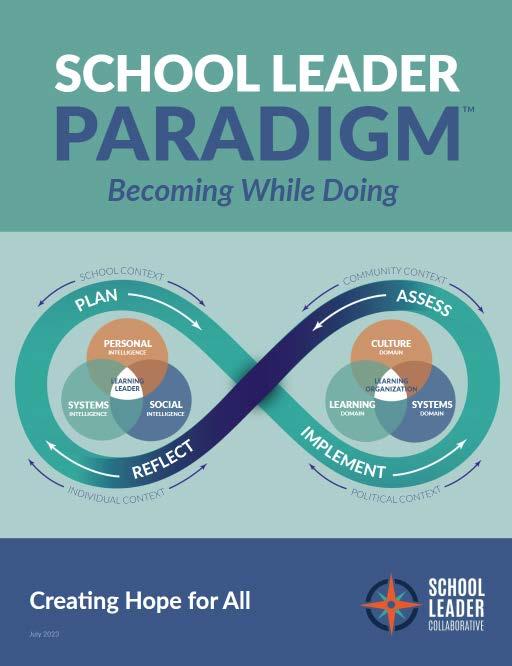



Special thanks to our Sponsors:







Dr. Kelly Andrews Director
Indiana Principal Leadership Institute
IPLI is a premier professional development opportunity for the practicing principals of Indiana. We support you, encourage you, and provide growth in your leadership as we learn together, lead together, and connect.
As summer winds down, the excitement for the new academic year is palpable among students, teachers, and parents alike. The Indiana Principal Leadership Institute (IPLI) is no exception, as it gears up to engage principals and teacher leaders in significant professional development after launching in July at ISU.
August sees the hallways of our schools once again filled with the sounds of learning and leadership. IPLI is at the forefront of this educational resurgence, offering principals the tools to succeed in the upcoming school year.
The back-to-school period is more than just a return to the classroom; it is an opportunity for growth, reflection, and setting new goals. IPLI recognizes the unique challenges that school leaders face and provides a supportive network to share best practices and innovative strategies.
This year, IPLI focuses on fostering resilience and adaptability in leadership. With the ever-changing educational landscape, principals must be equipped to handle various situations, from integrating technology in the classroom to addressing the social-emotional needs of their students.
As we embark on this academic journey, let's embrace the spirit of learning and lead by example. IPLI is here to support principals and teacher leaders every step of the way, ensuring that every school leader has the resources to make this year one of the most impactful yet.
Welcome back to school, and here's to a year of inspiring leadership and educational success!
IPLI EXTENDED 2024-25
IPLI Extended will have multiple opportunities for our graduates to grow professionally next year. You will hear from great speakers like
Cohort 11, Year 2 – speakers will include:
■ Dr. Phil Warrick -HRS Framework Levels 2 & 3 for September 2024 and January 2025
Cohort 12, Year 1 speakers will consist of for September 2024 and January 2025
■ *Dr. Nate Regier and Dr. Ryan Donlan: Personality & Leadership: Stewardship of Your Greatest Assets

■ Dr. Todd Whitaker: What Great Principals Do Differently
■ Dr. Steve Gruenert: School Culture Rewired 2.0
If you want to sign up for one or more sessions, the link to the application is on the IPLI website, www.indianapli.org , under the IPLI Extended tab at the top. Take time for your professional development and networking with Indiana leaders who have completed IPLI like you! And meet principals currently in the 2-year journey to support them as they learn. We encourage you to bring teacher leaders ($25 each) with you to the session(s) to participate in solid professional development that will keep you being the learning leader you are meant to be.
*September 25, 2024 - Cohort 12, Year 1: This seminar will be led by Dr. Nate Regier, a clinical psychologist, and Dr. Ryan Donlan, an ISU Professor, who are both Master Certified Trainers in the Process Communication Model. If you are interested in attending this seminar and want to receive a PCM Leadership Profile to be more fully engaged, please indicate that on the extended application; the inventory will be sent to you prior to the seminar. An additional charge of $100 will be required.
When you complete the Extended application, you will be invoiced for all seminars and the PCM inventory if indicated.
Don't miss out on the opportunity to grow through IPLI as a graduate and continue networking to increase your leadership capacity. One session or more sessions can give you time to regroup and share your professional thinking with others. Sign up today!
Unlock Your Leadership Potential with IPLI Extended! Are you ready to take your leadership skills to the next level? Look no further! Join our exclusive District or School Leadership Team Seminar hosted by IPLI Extended. What’s in Store for You?
■ Personal Leadership Capacity Enhancement: Dive deep into strategies and techniques that will empower you to lead with confidence, empathy, and vision. Whether you’re a seasoned district leader, principal, or an emerging teacher leader, this seminar is tailored to elevate your leadership game.
■ Process Communication Model (R): Discover your unique communication style and learn how to leverage it effectively. Each team member will receive a personalized PCM Leadership Profile, unlocking insights into your communication preferences, motivators, and stressors.
■ Problem-Solving Excellence: Tackling real-world challenges requires innovative solutions. During our one-
day seminar, you’ll collaborate with like-minded educators on your team to address a problem of practice specific to your school or district. Together, we’ll find actionable steps to drive positive change.
■ Expert Guidance: Your seminar will be facilitated by a certified PCM trainer with years of leadership development experience. Additionally, expert IPLI leaders will share their wisdom, ensuring you gain practical tools to implement immediately.
■ District Leaders: Superintendents, curriculum directors, and central office administrators.
■ School Leadership Teams: Principals, assistant principals, and teacher leaders.
■ Educators Passionate About Growth: If you’re committed to continuous improvement, this seminar is for you!
■ Ensure at least one team member is a principal graduate or a teacher leader who has participated in IPLI.
■ Visit our website at IPLI Extended and submit your application.
■ Secure your spot early—limited dates are available!
■ The cost and date of the seminar will be determined based on your team.
Don’t miss this opportunity to ignite your leadership journey. Register today and be part of a transformative experience!
For inquiries, please contact Dr. Kelly Andrews @ kelly. andrews@indstate.edu or visit us at www.indianapli.org.
Did you know that ISU offers four courses to principals during their 2-year cohort with IPLI that connect directly to their work in IPLI? Tuition is half the cost for these courses if they sign up during their cohort years. In addition, these courses may lead to entering the ISU Ed.S. program or transferring the credits to another Indiana institution.
The goal is to support our principals who may seek higher education while participating in research-based inquiry work. This is just another perk of participating in IPLI.
As Director of IPLI, I am excited for the future of schools in Indiana as the aligned system for principal professional development has never been more significant. INALI, IPLI, and IPLI Extended Learning Opportunity meet the need. IPLI is grateful for your ongoing support, trust, and dedication to education and educators during these challenging times, showing Indiana’s commitment to growing our schools and students.








Rochelle Maynard
Department Head and Assistant Professor of the Sharon Walker School of Education Morningside University
Rachel Louise Geesa
Associate Clinical Professor, Department of Educational Leadership
Ball State University
Sherri Barrow
Assistant Teaching Professor, Department of Educational Psychology
Ball State University
Derien Kunce
Graduate Student of Clinical Mental Health Counseling Ball State University
Starting the school year positively and well-organized is crucial to a principal’s position. To ensure you, as a principal, can meet your goals while promoting and practicing shared leadership, collaborative relationships, and partner engagement, consider the following tips:
Create Time, Schedule It, and Guard It
As a principal, your time can be absorbed by situations and issues that need immediate attention. This may leave you feeling at the end of the day that you did not complete goals as planned. To ensure you have time to complete your specific goals and tasks, consider possible opportunities during your personal time. For instance, can you arrive early to complete work when it is quiet and before teachers and staff arrive? This may give you an opportunity to check your email, work on reports, etc. From there, be intentional about time to work on your goals and protecting that time. When you begin to dip into your identified sacred time for meetings or other issues, you may consistently lose that time.
Schedule Team Meetings at a Consistent Time and Day
While meetings may be tedious and take more time than you anticipated, meetings can be imperative to keep your team focused on the mission and vision of the school. Schedule recurring meetings for groups such as the leadership team, data team, and continuous school improvement team. These meetings should take precedence in your schedule. Scheduling meetings at a recurring time at specific intervals will help ensure that time is on each team member’s calendar and the meetings are held with agendas, clear objectives, and minutes to follow.
Collaboration among teachers, school counselors, and principals is essential for principals to provide space for collective work on a consistent basis (Geesa et al., 2024; Holzberger & Schiepe-Tiska, 2021; Meyer et al., 2020; Robinson et al., 2008). The collective efficacy in a school can rise as teachers and school counselors have an opportunity to discuss what they are doing in their classrooms and student meetings and the impact it has on student achievement. Teachers can build relationships with one another and student support specialists (e.g., school counselors) by learning about what they are teaching and how they are teaching it. This helps build trust in the community of educators you have curated lessons to deliver quality curriculum to students, which helps increase teachers’ and school counselors’ beliefs in their collective ability to increase student achievement.
It is important for the principal to be present at times for team collaboration along with the school counselor(s) and other student support specialists who may share insights and collaborative ideas with teachers. School counselors help provide insightful information and input about the students with whom they work. Additionally, principals should see their school counselor as a partner as they collaborate with students, teachers, staff, parents, caregivers, and community partners. Scheduling time to meet with the school counselor and other student support specialists regularly helps to ensure there is ongoing communication about students to better meet their academic, social/emotional, and college-, career- and lifereadiness needs (ASCA, 2019).
Teachers, student support specialists, parents, caregivers, and community partners often need clear, consistent, and frequent communication from you, as the principal. Parents and caregivers entrust the care of their students to you and your teachers and school staff. It is helpful for parents and caregivers to hear from you about events, schedule changes, updates about current issues, etc. Teachers and school staff need to know what to expect so they can focus on doing their job as opposed to wondering what the schedule is for the day or what is happening in the school. By sending out a Monday Memo to school faculty and staff or a newsletter to parents and caregivers on a consistent basis, you may reduce anxiety for school partners and backlash from parents and caregivers
related to important school items. Clear and consistent communication is not only kind and helpful; it is necessary to ensure the focus and work related to the school mission and vision remains paramount.
Principals often advocate for the mental wellness of students, faculty, and staff, but may neglect care of themselves. A balance between work and personal time is critical to consider. While a 50/50 balance is often not realistic, it is important to prioritize time for oneself. Principals often carry the weight of the world on their shoulders when dealing with the problems and issues of others. Schedule time to care for yourself. In addition to ensuring you have time to care for your mental wellness, be empathetic to the needs of your faculty, staff, and students. Advocate for the resources teachers and school counselors need to support students.
Conclusion
Starting off your year on a positive path with all school partners may help you build collaborative relationships and lessen anxiety. You, as a school leader, can set the tone for the school year. Make it a great year!
References
American School Counselor Association. (2019). ASCA national model: A framework for school counseling programs (4th ed.).
Geesa, R. L., Maynard, R., Kunce, D., & Barrow, S. (2024). Exploring School Counselor-Principal-Teacher Collective Efficacy and School Counselor Leadership in Schools Journal of Educational Leadership and Policy Studies (JELPS) Volume, 8(1).
Holzberger, D., & Schiepe-Tiska, A. (2021). Is the school context associated with instructional quality? The effects of social composition, leadership, teacher collaboration, and school climate. School Effectiveness and School Improvement, 32(3), 465-485. https://doi.org/10.1080/09243453.2021.1913190
Meyer, A., Richter, D., & Hartung-Beck, V. (2020). The relationship between principal leadership and teacher collaboration: Investigating the mediating effect of teachers’ collective efficacy. Educational Management Administration & Leadership, 50(4). 1-20. https://doi. org/10.1177/1741143220945698National Policy Board for Educational Administration. (2015). Professional standards for educational leaders. https://www.npbea.org/wpcontent/uploads/2017/06/Professional-Standards-forEducational-Leaders_2015.pdf
Robinson, V. M., Lloyd, C. A., & Rowe, K. J. (2008). The impact of leadership on student outcomes: An analysis of the differential effects of leadership types. Educational Administration Quarterly, 44(5), 635-674.


Susan Miles Program Officer, Kids Caring & Sharing TM Riley Children’s Foundation
This link can be the first step in your school’s participation in an historic centennial giving year celebrating Riley Hospital’s 100th anniversary!
A lot of things have changed since 11-year-old Mark Noble of Decatur, Indiana, became the first patient admitted to the James Whitcomb Riley Hospital for Children in 1924 seeking treatment for polio. Since that time Riley has been a pillar of health and hope, evolving alongside medical advancement to provide the best care possible to the community and beyond.
None of this would be possible without your dedicated and generous philanthropic support. School fundraising has come a long way since the Kids Caring & SharingTM (KCS) program’s earliest days when a little boy in New Castle went door to door selling painted rocks to raise funds to help the children and families who need Riley Hospital. Today’s tech savvy students and school staff can now create and personalize online giving pages to invite support from friends and families anywhere in addition to hosting traditional inperson fundraising activities like Hat Days, carnivals, walk-athons, coin wars, and student versus school staff contests of all kinds.
Before you start planning this year’s Riley KCS campaign, let us take a moment to celebrate the incredible philanthropic efforts of Indiana K-12 schools in 2023-2024!
■ 372 Indiana K-12 schools engaged in fundraising efforts last year to support Riley kids and families, 52 more than in the previous year. That includes three school ESports teams participating in the national Extra Life program and 49 high schools participating in the national Dance Marathon program.
■ 88% of the participating schools achieved Red Wagon School status raising more than $1 per student.
■ 13 school corporations achieved Red Wagon Corporation status with every school in the corporation participating and achieving Red Wagon School status.
■ 61 school corporations achieved Riley Corporation status with either every school participating at some level, or the participating schools raising more than the entire corporation population.
■ 27 schools sponsored Riley Red Wagons with gifts of $5,000 or more
■ 25 schools earned Red Wagon Booster status with gifts of $3,000 or more.
All of these efforts resulted in an amazing $2.1 million to support Riley kids. Your gifts truly make a difference for the families who need the state’s only nationally ranked, comprehensive children’s research hospital.

While the Riley Children’s Foundation celebrates our highest fundraising year in 100 years with gifts totaling more than $71.9 million, our work is not finished, and we will continue to need your enthusiasm, your dedication, and your generosity to impact even more lives. Thank you for being such a valuable Riley philanthropy partner!
Kick off your school’s 2024-2025 Riley giving year and help us Tackle Childhood Cancer!
The American Cancer Society reports that:
■ Cancer is the leading cause of death by disease in children after infancy.
■ More than 9,600 children in the US under age 15 will be diagnosed with cancer this year.
■ 1,040 children under age 15 will die from cancer in 2024.
The data is harrowing and while major treatment advances in recent decades have increased the survival rate of children living 5 years or more following their cancer diagnosis to 85%, when it's your child you want better stats than that!
In 2016, South Vermillion High School varsity football coach Greg Barrett and his wife Molly lost their son Patrick Stephen to cancer. In Patrick's honor, the family established the PS We Love You Fund through the Riley Children's Foundation to support precision genomic testing and research at Riley Hospital where their son received care.
Each September, Pediatric Cancer Awareness Month, the Barrett family invites high school football teams and all schools across the state to help them "Tackle Cancer" by hosting special awareness and fundraising initiatives during football season.
Find out how you can get involved here.
All gifts raised through this initiative are recognized as part of your school’s 2024-2025 KCS participation.
Update your KCS gift submission information
Please connect with your school treasurer to update the Kids Caring & Sharing gift submission address. Mail all checks payable to the Riley Children’s Foundation by June 1, 2025, to:
Riley Children’s Foundation P.O. Box 3356 Indianapolis, IN 46206-3356
Attn: KCS/Susan Miles

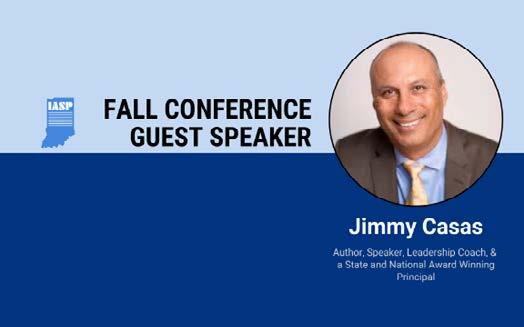


Séamus Boyce Attorney Kroger Gardis & Regas, LLP
Keith Butler Associate Attorney Education Law & Policy
Kroger Gardis & Regas, LLP
I’m almost certain seeing the smiling faces of your students and colleagues is right up there reviewing and updating your “legal” checklist. The mandated trainings that need to happen. New policies that need to be implemented. And, of course, all those reminders to colleagues so students stay safe and you stay compliant with the law. In this KGR Law Briefing, we cover some of the trending items that may not be on your checklist but should.
Communicating Policies (Changes, in particular) with Staff, Parents & Students.
Be sure that your school community is aware of and understands the policies and procedures. Be particularly diligent that you highlight changes. Review the common landmines that you have encountered in the past and how those can be prevented or at least mitigated.
Regarding student policies, we receive numerous Legal Help Desk inquiries regarding constitutional rights. A particularly hot topic has been school searches of student cell phones and other devices in compliance with the Fourth Amendment. Parents may think the prohibition of cell phones in the classroom will be enough to prevent students from using cell phones at school. But you know better. There could be more searching of cell phones to investigate messaging app usage during classroom time. Regardless of how you communicate your policies, make sure you do it in such a way that you can demonstrate that they had ample opportunity to review the policies that apply. For example, think about the situation where a student and that student’s parents are claiming ignorance to a policy. You want to be able to show them that they were made aware of the policy, and it shouldn’t be new to them.
SEA 1 contains most of the newer laws on reading skills. Of note for this year is the need to notify parents about reading assessment results, interventions, and remedial action. The IREAD needs to be given to second graders and an assessment should be given to kindergarten through second grade students who are not tracking for proficiency.
Pursuant to SEA 282 , schools must adopt a truancy prevention policy regarding K – 6. If a student has five (5) unexcused absences in ten (10) weeks the school must send a notice to the parent. The notice must include that: the parent is responsible for monitoring and ensuring the student’s attendance and compliance with attendance laws; the school will initiate truancy prevention measures including reporting; the parent is required to attend an attendance conference; and if the student is habitually truant provide information about juvenile court and DCS.
The attendance conference is supposed to occur within five days after the student has accumulated the five unexcused absences. The conference should include at least the parents, the teacher, and a school representative. At the conference, the group must discuss the student’s absences and establish a prevention plan. The plan cannot last more than 45 days. The school is required to offer additional counseling services to the student if the absences are related to the student’s pregnancy, foster care, homelessness, or severe illness / treatment.
In SEA 185, public schools are required to implement a policy regarding wireless communication devices. A “wireless communication device” is defined as a portable wireless device that has the capability to provide voice, messaging, or other data communication between two or more parties. This includes cell phones, laptops, tablets, and gaming devices specifically, but the definition
is not limited to those items. The policy must prohibit students from accessing a wireless communication device during instructional time unless permitted by a teacher for educational purposes. Exceptions also include: in the event of an emergency, to manage the student’s health care, and pursuant to an IEP / 504 plan.
Pursuant to HEA 1137, schools are required to excuse absences for religious instruction for not more than 120 minutes per week. The parent must provide written notice of the absence, and the principal, parent, and religious instruction provider are supposed to “work collaboratively” to ensure the period in which the student receives religious instruction does not disrupt instructional time.
In HEA 1104, your school safety plans must be updated to include an armed intruder protocol that focuses on the practical nature of the drill. The plan must provide accommodations for students who have mobility restrictions, sensory needs, or auditory or visual limitations. Advanced notice of a drill to employees and parents is required (and we think one general notice at the start of the year will suffice). The school must provide alternative exercises for students who are unable to participate. Schools have to provide access to mental health services on school grounds following the conclusion of the drill. Finally, you should review the law in depth particularly if your drill includes simulation of gunfire or other “sensory components or activities.”
What is the legal lesson from this brief?
We know your checklist is not getting any smaller, but certainly don’t lose sight of those often - legal compliance items as you get the school year off to a great start.
We at the KGR Legal Help Desk are here to address these education and any nonpersonal employment legal issues for IASP members. Until the next KGR Law Brief, stay legal!
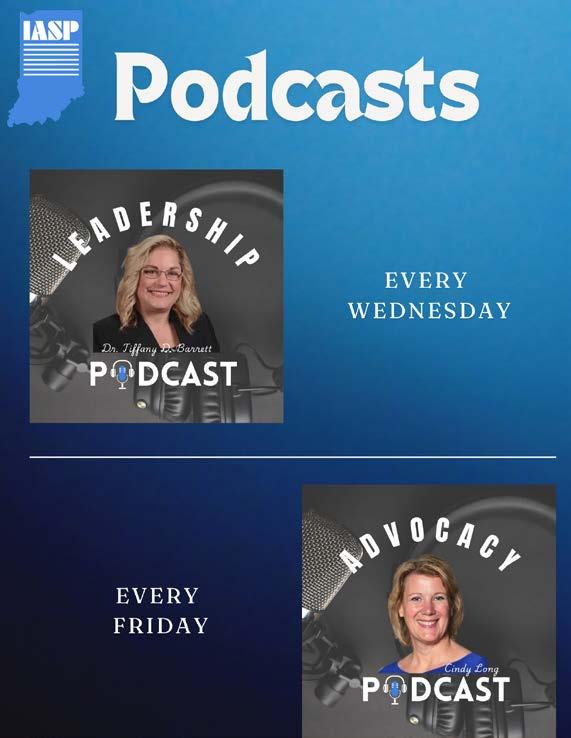
11025 East 25th Street
Indianapolis, IN 46229
1-800-285-2188 or 317-891-9900
www.iasp.org | iasp-info@iasp.org
